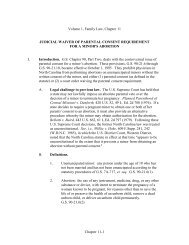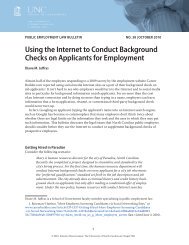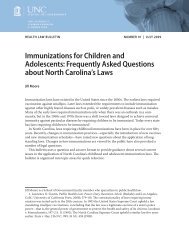<strong>Health</strong> Law Bulletin No. 82 September 2005Question 4. May I disclose confidentialin<strong>for</strong>mation in response <strong>to</strong> a subpoenaalone?Unless other conditions are satisfied, a subpoenais usually not sufficient <strong>to</strong> authorize disclosure ofconfidential in<strong>for</strong>mation. Most confidentiality laws—including those dealing with medical in<strong>for</strong>mation—contain some provision permitting disclosure ofconfidential in<strong>for</strong>mation in legal proceedings. Someallow disclosure in response <strong>to</strong> a subpoena, but mostimpose stricter conditions, such as entry of an orderby a judge or prior notification of the individual whois the subject of the records. If you receive asubpoena <strong>for</strong> confidential in<strong>for</strong>mation, you mustconsider the particular statute or regulation governingthe in<strong>for</strong>mation and determine the conditions underwhich you may disclose it. Questions 26 through 32discuss those conditions.An at<strong>to</strong>rney who issues a subpoena shouldlikewise be wary of examining confidentialin<strong>for</strong>mation on the strength of the subpoena alone. Insome circumstances, an at<strong>to</strong>rney who reviewsconfidential in<strong>for</strong>mation without appropriateauthorization may be subject <strong>to</strong> sanctions or evencivil liability. 6 For this reason, if they anticipate thatrecords contain confidential in<strong>for</strong>mation, someat<strong>to</strong>rneys (particularly in criminal cases) prefer <strong>to</strong>apply directly <strong>to</strong> a judge <strong>for</strong> an order <strong>for</strong> productionof records rather than issue a subpoena themselves. 76. See Bass v. Sides, 120 N.C. App. 485, 462 S.E.2d838 (1995) (be<strong>for</strong>e obtaining judge’s permission, plaintiff’sat<strong>to</strong>rney reviewed confidential medical records ofdefendant that records cus<strong>to</strong>dian had sealed and mailed <strong>to</strong>clerk of court in response <strong>to</strong> subpoena; judge orderedplaintiff’s at<strong>to</strong>rney <strong>to</strong> pay defendant’s at<strong>to</strong>rney fees,<strong>to</strong>taling approximately $7,000, and prohibited plaintifffrom using records at trial); Susan S. v. Israels, 67 Cal.Rptr. 2d 42 (Cal. Ct. App. 1997) (at<strong>to</strong>rney read anddisseminated patient’s confidential mental health recordsthat treatment facility had mistakenly sent directly <strong>to</strong> him inresponse <strong>to</strong> subpoena; court allowed patient’s suit againstat<strong>to</strong>rney <strong>for</strong> violation of state constitutional right ofprivacy); North Carolina Rules of Professional Conduct,Ethics Op. 252 (North Carolina State Bar Ethics Comm.,July 1997) (at<strong>to</strong>rneys should refrain from reviewingconfidential materials inadvertently sent <strong>to</strong> them byopposing party).7. In criminal cases, such an application by a criminaldefendant has come <strong>to</strong> be known as a Ritchie motion,named after a U.S. Supreme Court decision authorizingcriminal defendants <strong>to</strong> obtain access <strong>to</strong> potentiallyexculpa<strong>to</strong>ry in<strong>for</strong>mation, even if confidential, in the hands<strong>Responding</strong> <strong>to</strong> such an order is discussed further inQuestion 25, below.Question 5. What happens if I discloseconfidential in<strong>for</strong>mation when notpermissible?Several adverse consequences may follow. Youor your health department could be subject <strong>to</strong> afederal investigation and possibly civil penalties orcriminal prosecution, depending on the circumstancessurrounding the disclosure. 8 You could be subject <strong>to</strong>criminal prosecution under state law <strong>for</strong> disclosingconfidential in<strong>for</strong>mation. For example, improperdisclosure of in<strong>for</strong>mation identifying a person withcertain communicable diseases is a misdemeanor. 9As an employee of the health department, you couldalso be subject <strong>to</strong> discipline (including discharge) <strong>for</strong>failing <strong>to</strong> comply with confidentiality laws or healthdepartment confidentiality policies. In rare cases, theperson whose privacy has been compromised maybring a private lawsuit requesting money damages orof a third person. See Pennsylvania v. Ritchie, 480 U.S. 39(1987); 1 JOHN RUBIN, THOMASIN HUGHES & JANINEFODOR, NORTH CAROLINA DEFENDER MANUAL § 4.7A, at35–38 (May 1998) (describing procedure <strong>to</strong> obtain cour<strong>to</strong>rder <strong>for</strong> production of records); see also In re AlbemarleMental <strong>Health</strong> Center, 42 N.C. App. 292, 256 S.E.2d 818(1979) (in certain circumstances, prosecu<strong>to</strong>r may obtaincourt order <strong>for</strong> production of records held by cus<strong>to</strong>dian ofrecords).8. 42 U.S.C. §§ 1320(d)(5), (6) (outlining civil andcriminal penalties <strong>for</strong> violations of the administrativesimplification provisions of the <strong>Health</strong> InsurancePortability and Accountability Act of 1996 [HIPAA]); 70Fed. Reg. 20,224 (April 18, 2005) (interim final regulationgoverning imposition of civil monetary penalties <strong>for</strong>violations of the HIPAA Privacy Rule); Scope of CriminalEn<strong>for</strong>cement Under 42 U.S.C 1320d-6, Mem. Op. <strong>for</strong>General Counsel, U.S. Dept. of <strong>Health</strong> and Human Servicesand Senior Counsel <strong>to</strong> the Deputy At<strong>to</strong>rney General, U.S.Dept. of Justice (available at www.usdoj.gov/olc/2005opinions.htm) (interpreting scope of HIPAA’scriminal penalties).9. See G.S. 130A-143 (establishing permissibledisclosures of in<strong>for</strong>mation identifying persons with certaincommunicable diseases); 130A-25 (making violations ofChapter 130A a misdemeanor); 14-3(a) (classifying anyunclassified misdemeanors as Class 1 misdemeanors).4
September 2005 <strong>Health</strong> Law Bulletin No. 82other relief against you, the health department, or thecounty. 10Question 6. What are permissibleresponses <strong>to</strong> a subpoena?Ordinarily, you must respond <strong>to</strong> a subpoena insome fashion even if you believe that the subpoenaalone does not permit you <strong>to</strong> disclose the confidentialin<strong>for</strong>mation it seeks. You have several possibleoptions.Be<strong>for</strong>e the proceeding commences, you maycontest the subpoena—that is, you may challengeit—if you believe it is objectionable. You may do thisby making a motion <strong>to</strong> quash or modify, which asksthe court <strong>to</strong> invalidate or at least limit the subpoena.In the case of a subpoena <strong>to</strong> attend a deposition (or <strong>to</strong>produce records when no proceeding is scheduled),you may submit written objections <strong>to</strong> the party whoissued the subpoena in lieu of filing a motion with thecourt (see Question 23, below). To contest asubpoena, ordinarily you will need <strong>to</strong> consult with anat<strong>to</strong>rney.In some circumstances, you may be able <strong>to</strong> makealternate arrangements be<strong>for</strong>e the proceedingcommences with the party who issued the subpoena,as he or she has the authority <strong>to</strong> excuse you from thesubpoena’s requirements. 11 For example, a party maybe willing <strong>to</strong> excuse you from appearing if youprovide the requested records in advance. You mayagree <strong>to</strong> such an arrangement if the records are notconfidential, but ordinarily you may not if they areconfidential (see Question 21, below). If you receivea subpoena <strong>for</strong> documents, you also may be able <strong>to</strong>mail the records <strong>to</strong> the court ahead of time and avoidappearing; but, if the records are confidential, youmay be unable <strong>to</strong> use this procedure (see Questions20 and 30, below).Often the easiest course is <strong>to</strong> appear at theproceeding as directed by the subpoena. It isimportant, however, <strong>to</strong> understand the limits on youractions when the subpoena seeks confidentialin<strong>for</strong>mation, either through your testimony or fromrecords. If the patient or other subject of confidentialin<strong>for</strong>mation has not given you proper authorization <strong>to</strong>10. See, e.g., Jennings v. Univ. of North Carolina atChapel Hill, 340 F. Supp. 2d 666, 678 (M.D.N.C. 2004)(summarizing North Carolina law related <strong>to</strong> the commonlaw <strong>to</strong>rt of invasion of privacy).11. See generally G.S. 8-63 (witness summoned <strong>to</strong>appear in court may be excused by party at whose instancewitness was summoned).disclose the in<strong>for</strong>mation, you may appear at theproceeding but ordinarily may not disclose thein<strong>for</strong>mation without an order from the judge. Theoption of appearing at the proceeding and awaitingfurther direction by the judge is discussed inQuestion 29, below.Question 7. Are there any circumstancesin which one does not have <strong>to</strong> respond <strong>to</strong>a subpoena?Very few. A subpoena is a <strong>for</strong>m of court order,commanding you <strong>to</strong> appear at the time and placeindicated with the requested materials. If you ignore asubpoena and a judge later finds that it was validlyissued, you could be held in contempt. 12 In essence, afinding of “contempt” signifies that you purposelydisobeyed a court order, such as a subpoena,exposing you <strong>to</strong> a fine or, in extreme cases,imprisonment. Only in the rarest of circumstanceswould it be safe <strong>for</strong> you <strong>to</strong> disregard a subpoena (seeQuestion 14, below, on subpoenas <strong>for</strong> out-of-stateproceedings).Mechanics of <strong>Subpoenas</strong>Question 8. Who can issue a subpoena?Any North Carolina judicial official may issue asubpoena <strong>for</strong> a case in state court. Judges,magistrates, and clerks of court all are judicialofficials. An at<strong>to</strong>rney <strong>for</strong> a party <strong>to</strong> the case also mayissue a subpoena, and often the subpoena you receivewill be from an at<strong>to</strong>rney. Under the 2003 changes <strong>to</strong>Rule 45 of the North Carolina Rules of CivilProcedure, a party <strong>to</strong> a case who is not represented bycounsel may no longer issue a subpoena; he or shemust apply <strong>to</strong> a judicial official, such as the clerk ofcourt. 13Question 9. Does a judicial official have <strong>to</strong>review a subpoena be<strong>for</strong>e it is issued byan at<strong>to</strong>rney?No. An at<strong>to</strong>rney may issue a subpoena withou<strong>to</strong>btaining permission from a judicial official. But, as12. See N.C. R. CIV. P. 45(e); see also G.S. 8-63(providing <strong>for</strong> monetary penalties <strong>for</strong> violation ofsubpoena).13. See N.C. R. CIV. P. 45(a)(4).5













